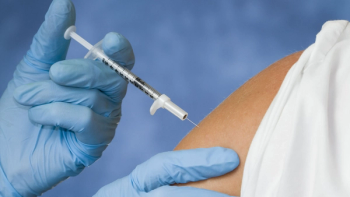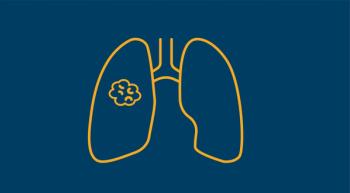
Longer follow-up data from the phase 1/2 CodeBreaK 100 trial show that patients with KRAS G12C–mutant non–small cell lung cancer experienced improved prolonged overall survival and encouraging response rates with sotorasib.


Longer follow-up data from the phase 1/2 CodeBreaK 100 trial show that patients with KRAS G12C–mutant non–small cell lung cancer experienced improved prolonged overall survival and encouraging response rates with sotorasib.

Patients with YAP1 and inflamed T-cell expressing extensive-stage small cell lung cancer experienced superior overall survival following treatment with durvalumab and etoposide.

An update from the phase 3 SKYSCRAPER-02 trial found that tiragolumab to atezolizumab did not significantly improve progression-free survival in extensive-stage small cell lung cancer.

Patients with metastatic RET fusion–positive non–small cell lung cancer experienced encouraging responses with selpercatinib.

Findings from the KEYNOTE-091 trial showed that patients with non–small cell lung cancer who were treated with pembrolizumab following complete resection and chemotherapy had a 24% decreased risk of recurrence compared with a control arm.

Frontline treatment with poziotinib yielded promising overall response rates in patients with non–small cell lung cancer and HER2 exon 20 insertion mutations.

The general population experienced nearly double the amount of anxiety and depression that patients with non–small cell lung cancer reported during the COVID-19 pandemic.

Nivolumab combined with chemotherapy is now approved in the resectable non–small cell lung cancer setting.

The FDA has initiated a priority review for neoadjuvant nivolumab plus chemotherapy to treat patients with resectable non–small cell lung cancer.

Adagrasib is currently being considered for approval as a treatment option for previously treated patients with KRAS G12C-mutated non-small cell lung cancer.

Pembrolizumab was associated with the first positive clinical trial outcomes in the adjuvant setting of non–small-cell lung cancer.

New data support smoking cessation for patients with lung cancer following their diagnosis.

Patient advocate Jill Feldman led the development of the language guide to help promote patient-centered, stigma-free language across the lung cancer community.

Patients with various solid tumor types experienced improved antitumor immunity after adhering to a diet with severe caloric restrictions.

As minimally invasive surgery for lung cancer increases in popularity, more patients are recovering at home, expanding the need for personalized caregiver education.

A study in France showed that patients with lung cancer, a population initially excluded from COVID-19 vaccination registration trials, were able to safely receive 3 doses.

A total of 7.4% of patients received a secondary or downstream procedure within the 12 months following their lung cancer screening.

Trilaciclib was associated with reduced chemotherapy-induced myelosuppression and the need for associated supportive care in patients with a subtype of lung cancer.

Antoinette Wozniak, MD, FACP, FASCO, outlines the importance of careful patient monitoring in lung cancer and emerging therapy options expected to change the treatment landscape.

Sintilimab, a bevacizumab biosimilar injection, met the primary end point of the phase 3 ORIENT-31 trial by significantly increasing progression-free survival in patients with EGFR-mutated, nonsquamous, non–small cell lung cancer.

Atezolizumab is the first immunotherapy approved in the adjuvant setting to treat NSCLC.

The Pfizer-BioNTech COVID-19 vaccine induces similar levels of COVID-19 antibodies in patients with solid cancer compared with people without cancer.

“I think the biggest [change] that we’ve seen is the addition of adjuvant or consolidated chemotherapy following the completion of concurrent chemotherapy and radiation. We have seen the 4-year overall survival data now and the 5-year update from the PACIFIC study in the adjuvant setting, obviously confirming the initial signal that patients who have initiation of immunotherapy early carry a significant risk reduction for progression and overall survival…”

Sandra Duncan, RN, BSN, discusses her transition to clinical research, and what her responsibilities are like supporting the ongoing CheckMate-73L trial.

The FDA has green lit mobocertinib for the treatment of adult patients with locally advanced or metastatic non-small cell lung cancer with an EGFR exon 20 insertion mutation.